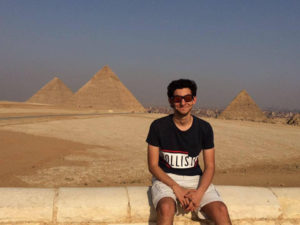SEforALL Mobilizes to Fight Climate Change
Climate change has increasingly garnered attention in political debates and public discussions. With unprecedented temperatures and unpredictable seasonal changes, the impact of climate change has already profoundly affected the general public. As a consequence, states and transnational corporations have been pressured to reform the energy sector to become a more carbon free, sustainable, and accessible market. As the twenty-second Conference of the Parties (COP22) is underway in Morocco, state and non-state actors are put to the test to show whether they will be able to cooperate and implement change.

In September 2011, UN Secretary-General Ban Ki-moon announced a goal to achieve sustainable energy for all by the year 2030. In response to this vision, the Sustainable Energy for All (SEforALL) initiative was launched. Rachel Kyte, the CEO of SEforALL, came to Georgetown University on November 7 to discuss how the organization is mobilizing action towards its 2030 goals.
Kyte explained how cooperation and reaching a multilateral deal with dozens of countries can prove to be a difficult task. Furthermore, Kyte emphasized the responsibility and influence powerful countries have in climate change agreements, saying, “The Paris Peace Agreement wasn’t possible without the United States and China.” The fact that countries that previously ignored climate change are now the front runners in energy reform proves that we are ushering in an era of super cooling, according to Kyte. This change in attitude is also reflected in transnational corporations and financial institutions who are developing strategies to adapt to the new carbon-free sustainable energy system. Bankers, energy chief executives, insurance lenders, and others are considering how their businesses will evolve in a world where climate change is leading to more floods, droughts, and other natural disasters.
At COP 21 in Paris last year, 185 countries and 114 companies participated in and agreed upon a new climate change agreement. Kyte acknowledged that the Paris Agreement was greatly dependent on non-state actors like energy companies. The question is, how can implementation be ensured? Although there is no explicit punishment for failing to comply with the agreement, Kyte explains that actors will be morally and economically isolated. Since sustainable energy reform is, according to Kyte, “a cry for justice, a cry for something better,” it has become more difficult for actors to walk away from commitments.
In order to achieve these sustainable energy goals by 2030, two major transitions need to occur. The first is the type of energy; Kyte argues that policymakers should shift public money from coal, oil, and gas to green technology or overhaul electricity grids to make room for more solar panels and wind turbines and fewer coal-fired power plants. Rich countries could also help their developing counterparts leapfrog the fossil fuel era and develop their economies without emitting greenhouse gases.
The second important transition hinges on transportation. In many instances, the technology for renewable energy exists but is inaccessible. In her lecture, Kyte stressed that access to sustainable energy “isn’t just a problem in Africa,” but also in the developed world. She shared how countries like the United Kingdom face energy price hikes in northwestern areas. SEforALL aims to provide universal access to modern energy services in order to double both the rate of energy efficiency improvements and the world’s share of renewable energy.
There is much optimism surrounding the goals set by the United Nations for a more accessible and sustainable future. In most countries around the world, climate change is no longer a partisanship issue, and, for the first time in human history, every country has committed to a climate change agreement. Without doubt, there remains much more work to be done. The Sustainable Energy for All initiative’s mission to deliver access to modern energy services to every home in the world strives to be part of a global solution.
 Wasil is an Egyptian freshman in the School of Foreign Service studying International Politics. He has lived in 9 countries, speaks 5 languages and is the founder of a community service NGO called Clean & Green Egypt. In addition, Wasil writes for his own media outlet named Nile Scope.
Wasil is an Egyptian freshman in the School of Foreign Service studying International Politics. He has lived in 9 countries, speaks 5 languages and is the founder of a community service NGO called Clean & Green Egypt. In addition, Wasil writes for his own media outlet named Nile Scope.
